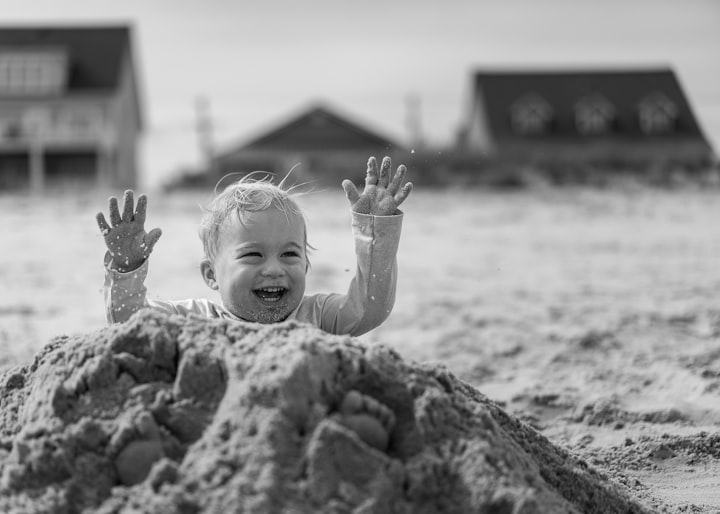What Parents Can Learn From Distance Learning
Small silver linings in a storm of suck-itude

It's easy to drown in fear, worry, and bone-deep tired.
Almost one year into the pandemic, many parents and their distance learners have gone way past each others last nerves. Parents soldier on, because it's their job, and I watch as kids eyes get glassier with every click of the mouse. Some of you may be reaching the point of returning your kids to school, feeling too spent for this new transition. I won't try to tell you it doesn't suck.
However, I have seen some teeny tiny silver linings to the last year, thoughts that will hopefully be instructive as we reach for stamina to meet the changes to come. No storm lasts forever, my dear parental soldiers, so keep holding on!
Understanding Education From the Inside
This past year, teachers have been forced to recreate the wheel in a way that has knocked even the best educator off his/her/their game. As a former teacher, I harbor no resentment for this, and neither should you. If your second grader can't keep track of email (because that's a totally realistic expectation) or your eighth grader lost the assignment link in a Google slides deck that goes fifty deep, it's time to let both the teacher and your kids (and yourself) off the hook.
What I wouldn't let the school system off the hook for is what millions of parents across the country are now understanding for the first time ever--the actual content and academic expectations faced by students. Every parent has a different level of involvement, but the following exchange is now obsolete: "How was your day?" "Fine." Parents now have more information than they ever wanted about the school day and its contents. You are seeing what is left out, like my cousin who realized that her five year old African-American son is only learning about slavery during Black History Month. You are seeing what is developmentally questionable, like the fifth grader I work with who is expected to construct cogent thesis statements. You are seeing the sheer overkill in the amount of work given, often more than is necessary for true mastery of a concept.
You are seeing it all, but it's hard to know where to go from there. It's easy to say, "Well, the teachers are the professionals, they know best." While that's true in some regards, you are the professional when it comes to your child. I wish I could've known as a teacher, what I know now after working with kids in their homes. I know there are never enough hours in the day, but talk to your principals, your school site councils, your PTA's, your school boards.
Worried about coming off as "that parent"? That's a fair worry with an easy solution. Direct little to none of these worries at your child's teachers, and phrase them as worries instead of complaints when you do bring them up. If you can propose a solution, even better. Teachers are working their asses off for your kids, and always will be, but the broad majority of the problems in education are housed in levels above their pay grade. Some of these levels are run by people who have not been inside a classroom for a very long time.
Getting involved, to whatever degree is possible for you, is not about fixing the whole system. It's about being able to say to your child, "It's important to me that your education reflects your needs, and not just what someone else has decided your needs should be." That kind of involvement makes children feel seen, and holds school districts accountable.
Reduced Pressures
Believe it or not, there are a small subset of kids that are thriving during distance learning. They no longer face the degree of bullying or social navigation that they did before, they get to wake up at a slightly less punishing time, and if they're having a rough day, they get to have it in a familiar environment, often with people to help. I'm not suggesting that it's healthier or better to keep your kids at home. What I am saying is that if your young person goes back to in-person schooling, and it's going poorly, they may have been facing pressures that you were unaware of in the past.
Keep your eyes open as this transition happens, and be explicit in opening the conversation, if need be. "Are there any parts of distance learning that you miss, now that you're back at school?"
Ownership of Education
Many of our older students have used distance learning to take control of their education. Let me be clear, I'm not talking about students who are missing large numbers of classes or not turning in any assignments. That is an engagement problem rooted in a flight-fight-freeze response to our current situation. I'm talking about students who opt out of certain practices or "assignments" that a teacher can no longer check, because they know they don't need them.
I work with an 8th grader who is a voracious and curious reader. She picks up bags and bags of books, in multiple genres, at the library each month. Last week she relayed to me that she had stopped annotating the text of the class novel because the teacher was no longer checking their annotations. She knows herself and what she needs for her reading development, and it's not annotation practice--SHE NEEDS TO READ. But in the physical classroom, it is a lot harder to tell kids that some people need to do an assignment and some people don't. This is not a lazy kid. She struggles in math, and (mostly) willingly brings herself to her parents every night for help with those concepts. But with reading, she's got it covered.
This kind of engagement sounds rare, but I think it's become more possible this year, and that we should celebrate and nurture its blooming. Again, open an explicit conversation with older kids as they go back to school: "Are there any assignments, routines, procedures in class, that you don't think contribute to your learning?" They may not always be right about their answer, but with specific understanding of their self-evaluation, you can have more informed conversations with their teachers, asking more fruitful questions.
Distance Learning and Curiosity
Everywhere I look in education circles, there is a fear of learning loss and kids getting irreparably behind, the longer the pandemic goes on. For students who were "behind" or disengaged when the pandemic started, there is some truth to this fear. However, if we leave the conversation there, I think we miss the opportunity for the larger conversation.
HOW DID OUR KIDS CURIOSITY DIE?
Because, to be quite frank, for curious kids, learning loss is not a thing. First of all, the large majority of curriculum is recursive--taught multiple years in a row from different vantage points and levels of complexity. If they miss it this year, they'll have other chances for the most part. But more than that, curious kids will always find a way to learn (and kids are naturally curious until we train it out of them). They will ask questions, read independently, make hypotheses, build and destroy, basically all the things we would expect from a learner. Thus, if they struggle with this new distance learning package for their public education, they are still going to be alright.
As you search for these curiosity killers, here are a few things you already know. Curiosity is an act of leaning forward into the unknown. As such, it requires that the person has a fairly stable sense of safety. Sometimes the things that subtract from our sense of safety are obvious, and sometimes they're not. Curiosity also requires role models, like any character trait that you'd like to become a life practice. If the adults in a child's life do not actively question, or even worse, if they shut down questions on a regular basis, curiosity will not flourish. What you refuse to talk about is often more instructive to kids priorities than what you will talk about. Finally, curiosity requires us to be around people, information, or places that inspire awe. Thankfully we have nature as a free source of awe, but there are literally thousands of other ways to create these encounters where we can't help but wonder.
I'll be happy to see the time when students and teachers can go back to school and work en masse, but if we let them go back to school as usual, I believe we've done them a disservice. Let's give the school system a little nudge as we start trickling back in. Sometimes the smallest drop of momentum can create the largest of revolutions.
About the Creator
Chelsea Delaney
Life is weird, write about it, paint about it, dance about it, and sing about it too. Use every language in your arsenal to sculpt the world you want to live in. Writer, educator, artist, and creative midwife--this is what I do.






Comments
There are no comments for this story
Be the first to respond and start the conversation.